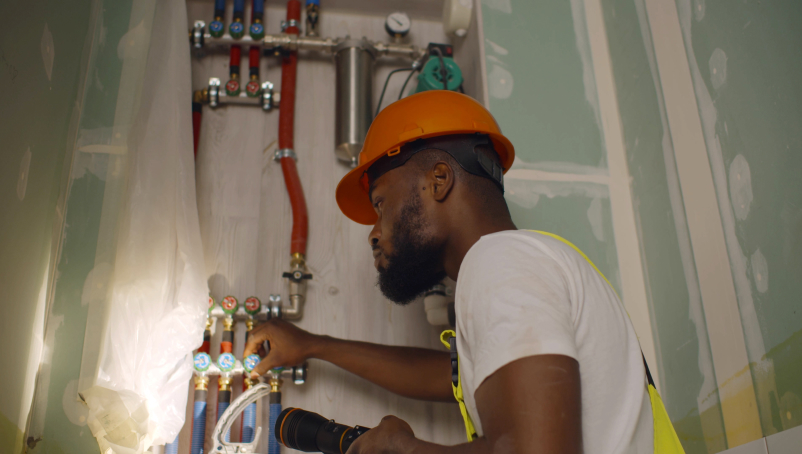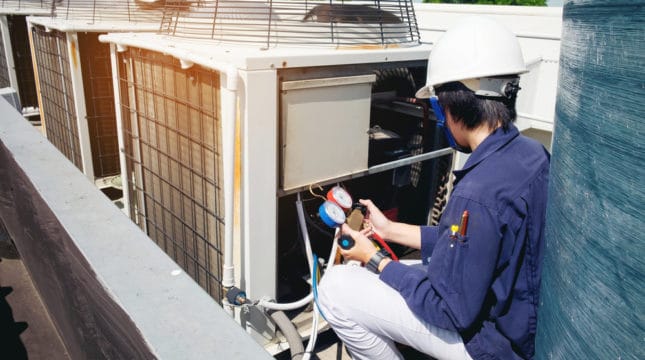Do you need an HVAC license in Colorado to do HVAC work?
No, the state of Colorado does not regulate HVAC technicians. Therefore, you won’t need to get a state-level license to work as an HVAC technician or contractor.
Before you begin to celebrate, there’s a caveat. Many HVAC projects contain electrical and plumbing components. So, depending on the type of work you do in Colorado, you may need to get an electrician’s license, a plumber’s license or both.
Colorado’s Department of Regulatory Agencies (DORA) provides regulatory oversight of electricians and plumbers in the state. Its two sub-agencies, the Colorado Electrical Board and the Colorado Plumbing Board, will issue your license(s).
According to the U.S. Department of Labor (DOL), 7,630 HVAC mechanics and installers work in the state. Also, HVAC jobs pay well, making them attractive. The annual mean wage is $62,800, according to the U.S. Bureau of Labor Statistics (BLS).
Insurance requirements for a Colorado HVAC license
If you do business as an HVAC contractor in Colorado, you’ll need several types of business insurance. While they may not be mandated at a state level for licensing, they could be required in your local jurisdiction.
General liability, workers’ compensation insurance and commercial auto will be mandatory in most jurisdictions. Several other types, such as commercial property and tool coverage, are optional but highly recommended. Here are the most common types of insurance you’ll need to buy or consider in Colorado.
Workers’ Compensation insurance
Colorado requires all employers, with certain exceptions, to maintain workers’ compensation insurance. This type of business insurance can help cover medical expenses and lost wages when employees get sick or injured at work.
Learn more about workers’ compensation for contractors.
General Liability insurance
General liability insurance can help provide coverage if someone other than an employee claims that your company’s actions caused them injury or property damage.
HVAC contractors must usually document that they have a minimum amount of liability insurance in Colorado to receive a license. The exact amount may vary by license, location or specific job. Typically, contractors need at least a $100,000 policy to qualify for a license. Cities or municipalities with sizable building projects may demand more coverage.
For instance, here are some representative liability insurance requirements in jurisdictions across the state:
Pikes Peak Regional Building Department requires general contractors with a Class A license to maintain $500,000 in single-limit liability (for bodily injuries and property damage) and contractors with a Class B or C license to have $300,000 in liability coverage.
Larimer County requires general contractors with Class A, B or C licenses to have $1 million in combined single-limit liability insurance. Contractors holding a single trade, roofing or mechanical license must have a liability insurance policy with a $300,000 combined limit.
The City of Longmont requires general contractors to purchase $1 million in combined single limit liability, $2 million in general aggregate liability protection and $2 million in products completed coverage.
Learn more about general liability insurance for contractors.
Commercial Property insurance
Commercial property insurance can help protect the property you rent or own for business purposes against damage or loss due to theft, fire, vandalism or other risks.
Business Owner’s Policy
A business owner’s policy, or BOP insurance, provides the coverage of general liability and commercial property policies combined in a single, cost-efficient bundle. It can help cover damage that you or your employees may accidentally cause to another person’s property and help protect your business equipment in the event of a fire or other covered event.
Tools and Equipment insurance
Tools and equipment insurance can help you repair or replace your HVAC work tools. It activates after tools are damaged or lost due to fire, vandalism, theft or other hazard.
Commercial Auto insurance
Colorado state law requires business owners with company-owned vehicles to purchase commercial auto insurance. The amount of protection required depends on the size and use of the vehicle. But certain minimum coverage limits apply:
- $25,000 for each individual in an accident;
- $50,000 for all people in any single accident; and
- $15,000 for property damage in any single accident.
Colorado HVAC license requirements
While Colorado does not have HVAC licenses at the state level, some local governments may require licensing or certification. Learn more below.
HVAC technician requirements
If you don’t want to start your own HVAC business but just want to work for one, you’ll need to credential yourself as an HVAC technician. The process typically unfolds as follows:
- Be at least 18 years of age
- Earn a high school diploma or GED
- Have a valid driver’s license
- Complete an HVAC training program
Training can follow two paths:
- You can either complete a technical or community college HVAC course of study; or
- You can become an apprentice to an HVAC company to complete on-the-job training. Most apprenticeship programs will involve working closely with an HVAC professional and attending classes to pass an HVAC certification exam.
You can get officially licensed after completing a formal HVAC training program or an apprenticeship. Although there’s no state-level HVAC licensing, several local cities and counties typically issue HVAC licenses. Earning such a credential can involve:
- Completing an HVAC class
- Amassing sufficient experience in the field
- Passing a formal trade exam
- Filing an official application
- Paying an application or licensing fee
For example, the Denver Community Planning and Development agency issues four types of Denver HVAC licenses (among other HVAC-related certifications, including refrigeration and boiler operations):
- HVAC journeyman
- HVAC Class A supervisor
- HVAC Class B supervisor
- HVAC, A/C, residential only
You’ll need to pass a test and document your experience for each of these licenses.
HVAC contractor requirements
If you want to own your own business, you’ll need to get licensed as an HVAC contractor. While there is no state-level licensure, you may need to secure a contractor license at the local level. This might involve getting licensed as an electrical, plumbing or HVAC contractor in the city or county where you plan to do business.
For example, the city and county of Denver has a two-step process for securing a contractor license. If you want to work in another Colorado city or country, check with its business permitting agency for specific requirements.
Aside from local education and experience requirements, generally, you’ll have to do the following to have an HVAC business:
1. Register your business
If you want to establish an HVAC contracting firm, your first step will be registering your company with the Colorado Secretary of State. Your business structure will determine the form you need to use.
2. Complete necessary tax documents
Next, contact the Colorado Department of Revenue, Taxation Division to request the permits needed, including income tax withholding, sales and use tax and unemployment insurance.
3. Get business insurance
Finally, if you plan to hire workers, you must comply with the state’s workers’ compensation requirements. Colorado requires virtually all businesses to buy and maintain adequate workers’ compensation insurance, with some exceptions. Familiarize yourself with the state’s workers’ compensation rules here.
Alternatively, you can arrange to self-insure your workers’ compensation coverage (pay the claims yourself). Refer to state guidelines for starting a self-funded workers’ compensation plan.
Earn your EPA Section 608 certification
The Environmental Protection Agency (EPA) mandates all HVACR technicians who service refrigeration systems must obtain EPA certification. HVAC technicians in Colorado must pass an exam with a minimum score of 70% and pay an exam fee of $120.
If you do any of the following activities, you’ll need to pursue EPA certification:
- Measure pressure within a refrigeration appliance by attaching and detaching hoses and gauges
- Add refrigerant to an appliance or remove refrigerant
- Perform any other action that violates the integrity of a motor vehicle cooling system or other small appliance
How to get a CO electrician license
Colorado electricians can obtain their licenses through examination or endorsement.
- Residential wireman electricians need 4,000 hours of residential-only electrical experience.
- Journeyman electricians need 8,000 hours of experience, half of which must be from commercial/industrial projects, and 288 hours of classroom training.
- Master electricians must either have an electrical engineering degree plus 2,000 hours of work experience; or have graduated from a trade school plus 8,000 of work experience; or have 2,000 hours of work experience working as a licensed journeyman.
Licensing by endorsement process can also secure a state license, particularly from states that adhere to National Electrical Reciprocal Alliance (NERA) standards. Out-of-state journeyman electricians can secure a Colorado license with minimal effort as long as they have a current, active journeyman or master electrician certificate.
Getting a plumbing license in Colorado
Colorado offers three types of plumbing licenses: residential, journey worker and master plumber. To qualify, one must document trade experience and pass a plumbing examination.
If you have a plumbing license from another state, you may be eligible for licensure by endorsement, provided you have comparable experience and passed an equivalent test.





